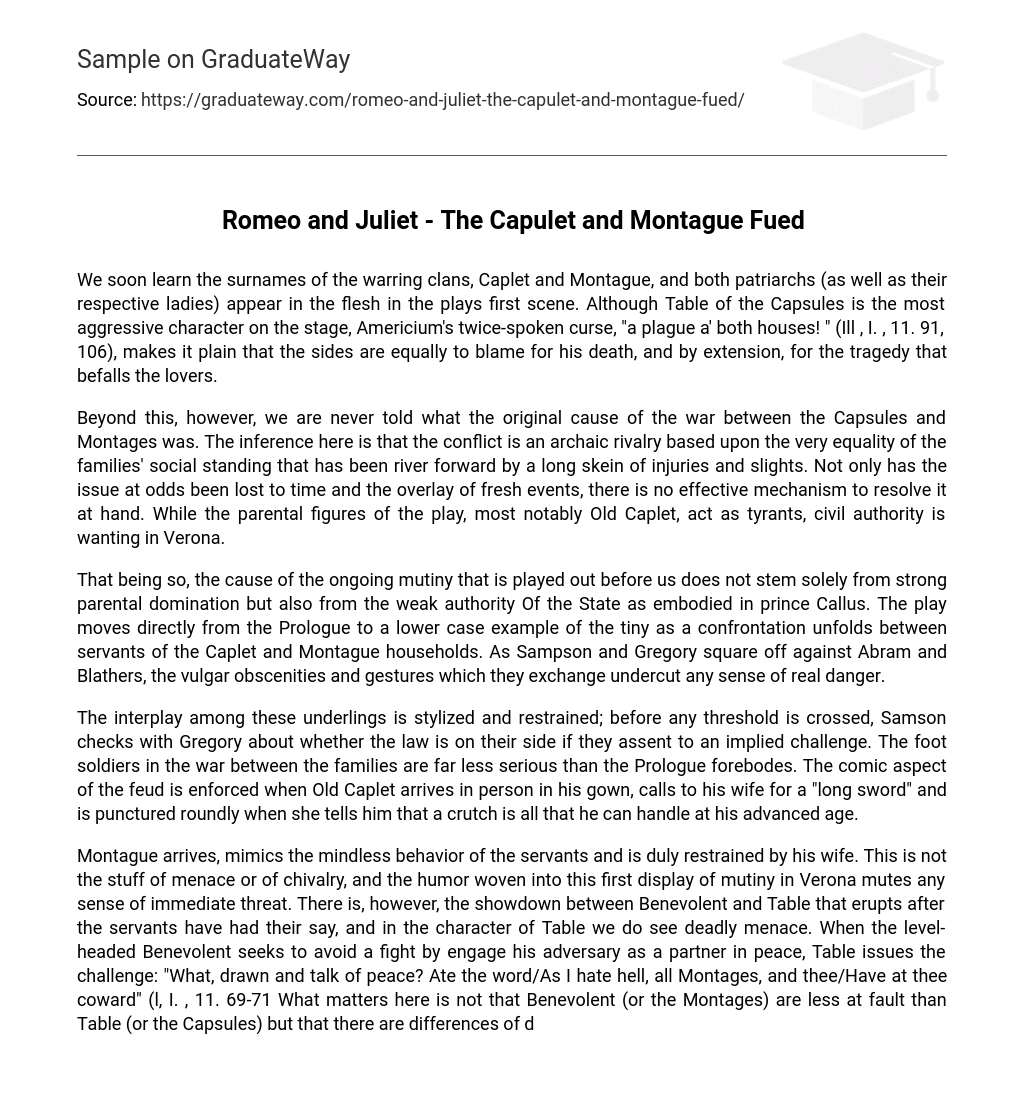We soon learn the surnames of the warring clans, Caplet and Montague, and both patriarchs (as well as their respective ladies) appear in the flesh in the plays first scene. Although Table of the Capsules is the most aggressive character on the stage, Americium’s twice-spoken curse, “a plague a’ both houses! ” (Ill , I. , 11. 91, 106), makes it plain that the sides are equally to blame for his death, and by extension, for the tragedy that befalls the lovers.
Beyond this, however, we are never told what the original cause of the war between the Capsules and Montages was. The inference here is that the conflict is an archaic rivalry based upon the very equality of the families’ social standing that has been river forward by a long skein of injuries and slights. Not only has the issue at odds been lost to time and the overlay of fresh events, there is no effective mechanism to resolve it at hand. While the parental figures of the play, most notably Old Caplet, act as tyrants, civil authority is wanting in Verona.
That being so, the cause of the ongoing mutiny that is played out before us does not stem solely from strong parental domination but also from the weak authority Of the State as embodied in prince Callus. The play moves directly from the Prologue to a lower case example of the tiny as a confrontation unfolds between servants of the Caplet and Montague households. As Sampson and Gregory square off against Abram and Blathers, the vulgar obscenities and gestures which they exchange undercut any sense of real danger.
The interplay among these underlings is stylized and restrained; before any threshold is crossed, Samson checks with Gregory about whether the law is on their side if they assent to an implied challenge. The foot soldiers in the war between the families are far less serious than the Prologue forebodes. The comic aspect of the feud is enforced when Old Caplet arrives in person in his gown, calls to his wife for a “long sword” and is punctured roundly when she tells him that a crutch is all that he can handle at his advanced age.
Montague arrives, mimics the mindless behavior of the servants and is duly restrained by his wife. This is not the stuff of menace or of chivalry, and the humor woven into this first display of mutiny in Verona mutes any sense of immediate threat. There is, however, the showdown between Benevolent and Table that erupts after the servants have had their say, and in the character of Table we do see deadly menace. When the level-headed Benevolent seeks to avoid a fight by engage his adversary as a partner in peace, Table issues the challenge: “What, drawn and talk of peace? Ate the word/As I hate hell, all Montages, and thee/Have at thee coward” (l, I. , 11. 69-71 What matters here is not that Benevolent (or the Montages) are less at fault than Table (or the Capsules) but that there are differences of degree in the animosity levels of individuals within each camp. In Act II, scene iv, after Benevolent apprises Mercuric that Table has challenged Romeo to a duel, we learn from Mercuric that, Table, he “Prince of Cats,” is a “idealist” and “a gentleman of the first house. Table’s membership in the Caplet family confers a certain status upon him, but his lethal intentions and the skill to act upon them put him at a particularly high “rank” within his clan and, in the eyes of those on his level, notably Mercuric himself. The bloodshed that occurs in the duel scene (Act I, scene iii) is not simply an inevitable outcome of two families at war, but of a social structure or sub-culture that has evolved over generations through which Table is matched with Mercuric. Returning to the plays opening scene, following a crowd of citizens shouting Down with the Capsules.
Down with the Montages,” Prince Callus enters and angrily complains to the heads of the warring factions that three times “civil brawls” have arisen from an “airy word” between Old Caplet and Montague. The Prince is not entirely accurate in his charge; the elderly men have had no hand in provoking the fracas. Callus then lays down the law, saying to both of the patriarchs, “If ever you disturb our streets again/Your lives shall pay the forfeit of the peace” (l, I. , 11. 6-97). The Prince’s order seems harsh and extreme in its finality, but it raises the question of what the Prince did after the first TV outbreaks.
The chink’s in the Prince’s authority widen after the deaths of Mercuric and Table at the outset Of Act Ill. Romeo is not sentenced to death for his crime, but merely exiled, and as for Old Montague and Old Caplet they are punished with fines for their responsibility in an incident much more serious than the hurry-burly of the first scene. Callus only partially acknowledges his weakness as an enabling force in the conflicts hat (seem to) end with the deaths of Romeo and Juliet when he casts his judgment: Where be these enemies?





